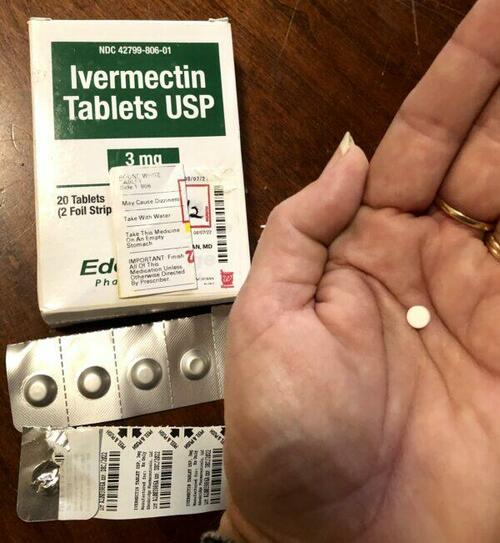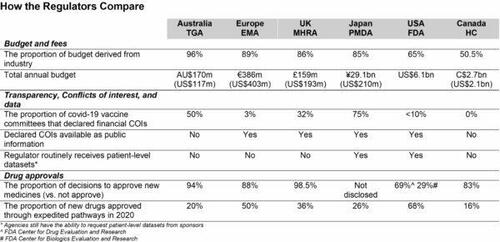Authored by Jessie Zhang via The Epoch Times (emphasis ours),
Australian medical practitioners can now prescribe ivermectin for COVID-19 among other diseases under new rules confirmed by the nation’s therapeutic goods authority.

The Therapeutic Goods Administration (TGA) announced on May 3 that the prescribing of oral ivermectin will no longer be limited to specialists such as dermatologists, gastroenterologists, and infectious diseases specialists.
The move—which takes effect from June 1, 2023—comes amid high rates of vaccination and hybrid immunity against COVID-19 in Australia and thus the use of ivermectin by individuals is unlikely to now compromise public health, the TGA said in a statement.
Despite ivermectin being regularly administered in countries including India, Brazil, and Africa, TGA said that approved vaccines and treatments should still be the preferred choice due to most studies showing that ivermectin is not a useful medicine for COVID-19.

“A large number of clinical studies have demonstrated ivermectin does not improve outcomes in patients with COVID-19,” the TGA statement said.
“The National Covid Evidence Taskforce (NCET) and many similar bodies around the world, including the World Health Organization, strongly advises against the use of ivermectin for the prevention or treatment of COVID-19.”
The Pharmacy Guild of Australia even wrote to the panel and advised against removing the Appendix D entry relating to ivermectin because they think that if the treatment is available, people may choose not to get vaccinated.
However, after weighing all risks, the TGA concluded that restrictions should still be removed.
“The risk of medical professionals prescribing ivermectin at higher doses, or for use against COVID-19, is low given the overwhelming evidence against ivermectin use for this indication,” TGA stated.
Drug Banned Because It Was a Threat to Vaccination Uptake
Australia banned general practitioners from prescribing ivermectin in Sep. 2021.
“The concern was the likelihood that persons prescribed the drug for COVID-19 would believe themselves protected and would not get vaccinated, and would not seek the appropriate medical care if symptoms developed,” the notice of the final decision by TGA said.
“This would pose a significant risk to the community through the spread of the disease as well as the risks to individuals using ivermectin for this purpose.”

They said that ivermectin was being advocated for use in “unreliable social media posts,” increasing the risk of overdose and misuse.
Additionally, they argued that there were national shortages, although little detail was provided about the supply issues in Australia or in other countries. India even reported an excess production capacity of 23 million units a month of ivermectin.
Study Finds Ivermectin Kills COVID-19
However, in a peer-reviewed study by Monash University in Australia, published in April 2020, it was demonstrated that ivermectin could eliminate SARS-Covid-19-2 in cells in 48 hours.
The team, who have been researching ivermectin for over ten years with different viruses, discovered that a dose of ivermectin could stop the SARS-CoV-2 virus from growing in cells.
“We found that even a single dose could essentially remove all viral RNA by 48 hours and that even at 24 hours, there was a really significant reduction in it,” senior research fellow and lead study author Kylie Wagstaff said.
“Ivermectin is very widely used and seen as a safe drug,” Wagstaff said.

The scientists said that the FDA-approved anti-parasitic drug has also been shown to be effective in vitro against a broad range of viruses, including HIV, Dengue, Influenza, and Zika virus.
They started investigating whether it worked on the COVID-19 virus as soon as the pandemic was known to have started.
However, the researchers announced a year later that they had paused their work due to insufficient sample size despite securing funding for clinical trials.
“The low numbers of COVID cases in Australia in 2020 meant the planned trial in Australia had to be paused,” the Monash University laboratory said in an ivermectin research progress update in Aug. 2021.
“The establishment of a trial depends on Australian and overseas circumstances and will be communicated when we are in a position to do so.”
Industry Incentives Under Scrutiny
Meanwhile, pharmaceutical authorities around the world are under growing scrutiny over the funding many receive from the industry itself, with an investigation revealing that half of their funding comes from the pharmaceutical industry—the industry they are supposed to be regulating.
In a report, published in the British Journal of Medicine, it was discovered that the U.S. FDA receives 65 percent of its funding from the pharmaceutical industry, the MHRA (UK) receives 86 percent, and the Australian TGA receives 96 percent of its funding from the pharmaceutical industry.
Additionally, award-winning investigative journalist Maryanne Demasi found in the report that the TGA approved 94 percent of all applications between 2020 to 2021.
She filed for FOIA report to get disclosures on the TGA committee members who had conflicts of interest in their approval of the mRNA vaccines, but the TGA allegedly redacted the identity of these members, highlighting that it was personal information.

The final decision to remove restrictions on ivermectin prescriptions followed an application to remove the rules, according to the process required under the Therapeutic Goods Act 1989.
It also took into account advice from an independent advisory committee on the scheduling of medicines and two rounds of public consultations.







